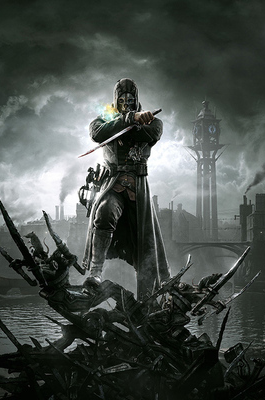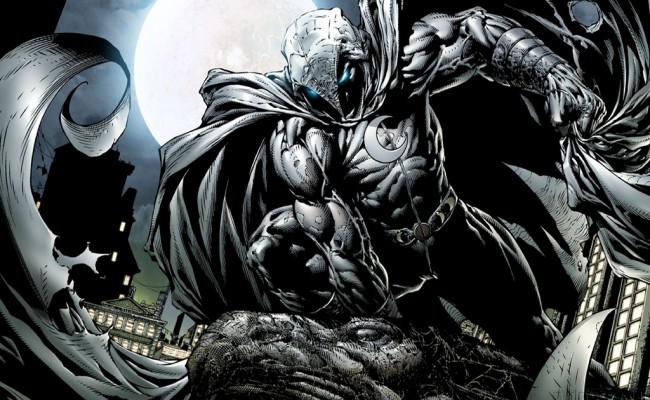Choice: Giving the player the tools to shape and craft their own game, from both a narrative and game-play perspective, has become one of the most popular trends in games over the last 5 years. Subjected to the gross over-saturation of the gaming market with an abundance of linear, corridor based shoot-’em ups, if choice is integrated intelligently, the depth, narrative-potency and impact of a game can be significantly enhanced by allowing the player to shape his or her own virtual destiny, rather than mindlessly spawning an endless line of meat-shields to be torn asunder.
With that in mind, enter one of the finest stealth/RPG/action games you’ll play this year -Dishonored, developed by Arkane Studios. Set in the Victorian steam-punk city of Dunwall, you play the role of Corvo, the bodyguard and protector to the Empress of Dunwall. As Corvo is returning from a diplomatic mission abroad, he arrives back just in time to see the Empress assassinated by several mysterious masked figures, who also kidnap Emily, the rightful heir to the throne. Corvo, left alive by the assassins, is blamed for the Empress’ murder and sentenced to death. After escaping from jail, you need to rescue Emily, clear your name, and exact vengeance on those accountable.
One of the first things that strike you is the city of Dunwall itself – a once grand and majestic city, now crumbling and falling to ruin due to a rat plague having decimated it’s citizens, with the remaining population abandoned to survive on whatever they find, whilst constantly under threat from the rats themselves and the ‘Weepers’ that wander the back-alleys (Dishonored’s Zombies – it seems even 19th Century London can’t get away from the ever-present bastards!). Graphically, it’s a visual treat, and the PC version, is as expected, the optimum platform to get the best experience. It’s a fantastically detailed, vibrant and atmospheric environment to explore, and the game’s pacing allows you to take your time and give you the opportunity to take in and appreciate the sweeping vistas from the many rooftops you’ll be climbing on your journey. There are clear influences from Bioshock’s art-design on the character models and locations, including the grand hall, where you attend a masked ball, and the foreboding lighthouse you ascend in one of the later levels, along with the Art-Deco style that pervades from the various Victorian era-inspired character models bringing life and vivacity to the world: The presentation style draws you in to this untamed industrial dystopia and doesn’t let go.

Most games, when trying to provide an element of choice, will give you either option A or B to select. One of Dishonored’s greatest strengths is removing this rigidity from how you play, delivering a more nuanced and personal experience. You can combine gung-ho action, confronting packs of enemies head on with quietly slipping your way through enemy ranks, minimising any commotion and silencing those you need to without being spotted. The more philanthropic will appreciate that it’s possible to complete the entire game without having to kill a single enemy – including the ‘bosses’, the ultimate target that each mission requires you to take out, which can be disposed off in a manner of non-violent ways. The levels themselves are essentially giant sandboxes, encouraging you to explore your surroundings, which you’ll need to do if you want to find hidden Runes (artifacts that allow Corvo to access magical abilities) and Bone Charms (small character bonuses you can add, which can increase the strength of healing potions, give greater resistance to Weepers etc), In fact, failing to branch out on your own and sticking too rigidly to the main story could see you miss huge chunks of the optional missions and objectives you can take on, which would be a huge shame, given the diversity of some of these challenges, such as planting poison in a whiskey distillery or manipulating a local gang-leader to access an art-dealers safe.
If action is what you’re after, Corvo is equipped with a range of weaponry, including a pistol, crossbow, grenades and explosive traps, all of which can be upgraded as you progress, and used to great effect to take out the patrolling guards that block your path. Your physical attacks can be augmented by using your the various mystical ‘powers. Summoning a Rat Plague, slowing down time, instant fatalities and more can all be used in a broad range of creative ways to take out your enemies; Wait for a guard to take fire a bullet at you – then pause time and use your Wind-Blast ability to blow the bullet right back from where it came, or summon a plague of rats, and while they devour an unsuspecting guard, posses one of the rats and sneak up behind another guard and unleash an instant kill. The variety and creativity afforded to how you dispose of your enemies is not just a heap of fun, but helps to develop Corvo into a superbly powerful and imaginative character to take control of.

Playing Dishonored as a stealth-game, a philosophy I rigidly stuck to on my first play-through (getting spotted meant an instant re-load), seems like a more natural fit to what the developers created .The intuitive level design significantly helps to empower the player and doesn’t hand-hold your in the way a game like Deus-Ex Human Revolution did – conveniently placing an air vent next to a well guarded room to tick off the ‘Stealth’ option from the check-list (don’t get me started on DXHR’s woefully inelegant and unnecessary boss-fights). This inorganic, ham-fisted approach to stealth is a mistake that Dishonored does not make, and you’ll feel as if you were the one who worked out how to avoid that seemingly unavoidable guard patrol, teleporting to a nearby rooftop, possessing a fish in the nearby river, and swimming undetected through a sewer-grate to safety. Guards can be incapacitated without lethal force, although you will need to be careful to dispose of the bodies safely to avoid detection.
Patience, something many developers place little commodity in, is required to learn guard patrol patterns and work out how to proceed through the multi-tiered levels without being spotted, and being awarded the distinguished ‘Unseen’ achievement. Despite the enjoyable combat and Corvo’s superhuman abilities,it does not take much to deplete his health, particularly when confronted with the imposing ‘Walker’ enemies in later levels, that rain down explosive crossbow bolts at you upon sight. This makes avoiding combat entirely even more enjoyable, and stealth powers, such as the ability to see through walls, greater agility and short-distance teleporting help you to plan your approach and as the game progresses, learn from your mistakes and evolve into a silent and predatory master of the shadows.
There a couple of minor grumbles about the overall package that ought to be aired. The story, whilst by no-means terrible, is a fairly well-worn tale of betrayal and lust for power, but to say the ‘stealthy’ ending is weak would be a colossal understatement, and without spoiling the plot, it contains one of the least surprising twists you’ll ever experience. With one or two exception the characters you interact with throughout your time in Dunwall are fairly wooden and unmemorable, and the AI of some of the guards can also be a little suspect at times – you can be spotted by an enemy, run away out of eyesight for 10 seconds, and the guard returns to his post as if nothing happened, for example.
However, these are all minor issues, and do very little to detract from what is overall, a highly enjoyable, imaginative and expertly crafted adventure, with a superbly-paced narrative and the self-awareness to allow the player to fashion a personal experience which retains its potency regardless of how you choose to experience it, shaped as much by the attention to small detail, as to game-play mechanics; The shuddering, whirring clunk of an approaching Walker, the satisfying whoosh sound as you teleport or the fluid animation as you quietly sink your blade through the back of an hapless guard. While the ending is a disappointing, this is a game that is all about the journey, rather than the destination, and it’s a trip that oozes class throughout.
Verdict: 5/5
Richard Fox.
Further gaming ramblings available on Twitter @foxy206














S#!T Talking Central